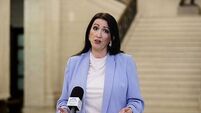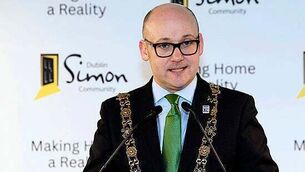Ruth Lawrence trial: What the jury didn't hear

Alison O'Riordan and Brian Kavanagh
Just a few days into Ruth Lawrence's trial, which was being heard 11 years after the Garda investigation began, prosecution counsel Michael O'Higgins SC told the judge in the absence of the jury that he had some "unexpected news".
Counsel told the court that Jason Symes, one of the two key witnesses in the case, had been admitted to hospital as an acute patient after suffering a heart attack.
Along with his daughter, Mr Symes was one of two protected witnesses in the case. He and Stacey Symes came forward to An Garda Síochána in 2014 and gave voluntary statements about the involvement of Lawrence and her boyfriend Neville van der Westhuizen in the murders of the two men.
Mr O'Higgins said Mr Symes was receiving medical treatment and the prosecution was awaiting a report. "I think it's extremely unlikely he will be available in the immediate future," counsel informed the court.
Mr O'Higgins said parties had to apply their minds as to whether the trial should proceed or not, assuming Mr Symes would not be available.
Mr Justice Hunt told counsel he would send the jury away for two days and only tell them that there were medical developments in relation to a witness in the case.
Mr O'Higgins asked that the media not report what had been said in the absence of the jury. Mr Justice Hunt also requested that the media don't report anything "that would be straying beyond the lanes".
Video link
Later that week, Mr O'Higgins applied to the court to have Mr Symes' evidence given via video-link, as he was unable to travel due to his illness.
In his application, counsel argued that there had been a much higher dependence "on video-type evidence" since the Covid-19 pandemic. He said giving evidence by video-link had almost become "a default" and was now very common.
However, defence counsel Patrick Gageby SC objected to Mr Symes giving his evidence via video-link, telling the court this was the first time in 15 years he had objected to testimony being delivered this way.
Mr Gageby argued that this was the type of case where it was "absolutely imperative" for the jury to see "this man in the flesh in the way which one doesn't necessarily see on a video-link".
"It is no small thing to say Mr Symes would appear to perhaps diminish any unfavourable aspect he might have been involved in," counsel said.
He asked the judge not to entertain the possibility of a video-link being used for Mr Symes to give his evidence.
Mr Justice Hunt told the defence that if he refused the application, it would mean Ruth Lawrence being in custody for very much longer. Mr Gageby said Ms Lawrence understood this.
Mr O'Higgins said the notion that core evidence could not safely be given by video-link testimony had been rejected by the higher courts.
He went on to say that the prosecution had "a vested interest in getting the trial on", as there had been an 11-year delay since the men's deaths.
"Time is passing, memory is fragile and the more time that passes, the more potential prejudice it is to the prosecution," Mr O'Higgins submitted.
In his ruling, Mr Justice Hunt said the most important matter was an assessment of the accused's fair trial rights. He said a fair trial is not a perfect trial.
Referring to Mr Symes, the judge said the witness was overtaken by a relatively serious but not life-threatening complaint, which required surgical intervention.
The judge asked whether an adjournment in the trial until January gave any guarantee as to whether Mr Symes would be in any more of a position to give his evidence in the courtroom. He said it seemed to him it would be a considerable imposition to abandon a trial that had already commenced.
The judge said there had to be a good reason bearing on the fairness of the trial for him to accede to the defence's application.
"Quite frankly I don't see it," he remarked.
Mr Justice Hunt acceded to the prosecution's application and said it was in the interests of everybody - particularly Lawrence - to "get on with the case if humanly possible".
Unfair
South African witness Robert Roger Brazelle, a pastor at the Christian Revival Church (CRC) in Pretoria, was also called by Lawrence's defence team to give evidence via video-link.
He told Mr Gageby that he had met Lawrence in Pretoria in early May 2016. "I was contacted by someone else to tell me she was in trouble, fearing for her life, fearing she was going to be trafficked," added the witness.
Asked whether Lawrence had involved herself in anything in Pretoria in July 2019, Pastor Brazelle said the defendant would assist him "with managing and running a safe house for other victims of human trafficking, caring for them and administering for them".
At this point, Mr O'Higgins asked the jury to leave the courtroom.
When the jurors left, Mr O'Higgins said he appreciated that Mr Gageby was doing his best to stay within the rules of evidence.
He said that although there could be no objection to Lawrence running a defence that she was a victim of human trafficking, the way to do so "was to give evidence in chief of that".
He added: "Evidence is being given that she has been the victim of human trafficking - it is an unfair position to put the prosecution in".
When asked by Mr Justice Hunt whether this was being put forward as some kind of defence, Mr Gageby said it was not. The judge said the evidence was not relevant at all.
Mr Gageby said it would be established that, while in South Africa, his client had bettered herself for the benefits of other persons. "I am entitled to say she has done something useful with her life," he added.
The jury were then returned to the courtroom.
'Simply not sufficient'
At the close of the State's case against Ruth Lawrence, Mr Gageby applied to the trial judge to withdraw the second count of murder.
Counsel acknowledged that on the first count, there was "some evidence from the mouth of Stacey Symes" that his client had shot Eoin O'Connor, but he said there was "not so much in relation to the second count" of the murder of Anthony Keegan.
Counsel submitted the evidence heard was "simply not sufficient" to establish Lawrence had killed Mr Keegan.
Mr Justice Tony Hunt said the height of the evidence on the second count was that the murder of Mr Keegan was part of a joint enterprise.
In reply, Michael O'Higgins SC, for the State, said the case was opened on the basis of joint enterprise. He said in a robbery, the man holding the ladder is as much a thief as his confederate climbing in the window.
Mr O'Higgins submitted there was evidence to show that Eoin O'Connor was induced on a false pretext to come to Co Cavan on April 22nd and evidence that van der Westhuizen and Lawrence were "working hand in glove" to kill Mr O'Connor.
Mr O'Higgins said Mr Keegan was murdered because he had the temerity to say he would die for his friend Mr O'Connor.
"There is a reasonable possibility of the prima facie case that once Mr O'Connor was going to be murdered, anyone who was with him was going to meet the same fate".
He submitted the only respectable inference to be made was that if Mr Keegan was being brought along as muscle, he wasn't going to be standing around watching and had been shot dead already.
In his ruling, Mr Justice Hunt said ultimately, it was for the jury to make decisions of fact on the basis of the evidence and it is "always the case that one man's inference is another man's speculation".
He said it was up to the jury as to whether they were satisfied Lawrence had laid the contribution to the joint enterprise to support the murder conviction in the case of Mr Keegan.
The judge rejected the application to withdraw the murder charge on count two and said the indictment could not be "surgically split up" in the way Mr Gageby had suggested.
He said this was not a case where there is no evidence, but rather evidence of a direct variety. "I pose myself the fundamental question: would a conviction on the evidence be a miscarriage of justice. I think not..it is a matter for the jury after that," Mr Justice Hunt concluded.



